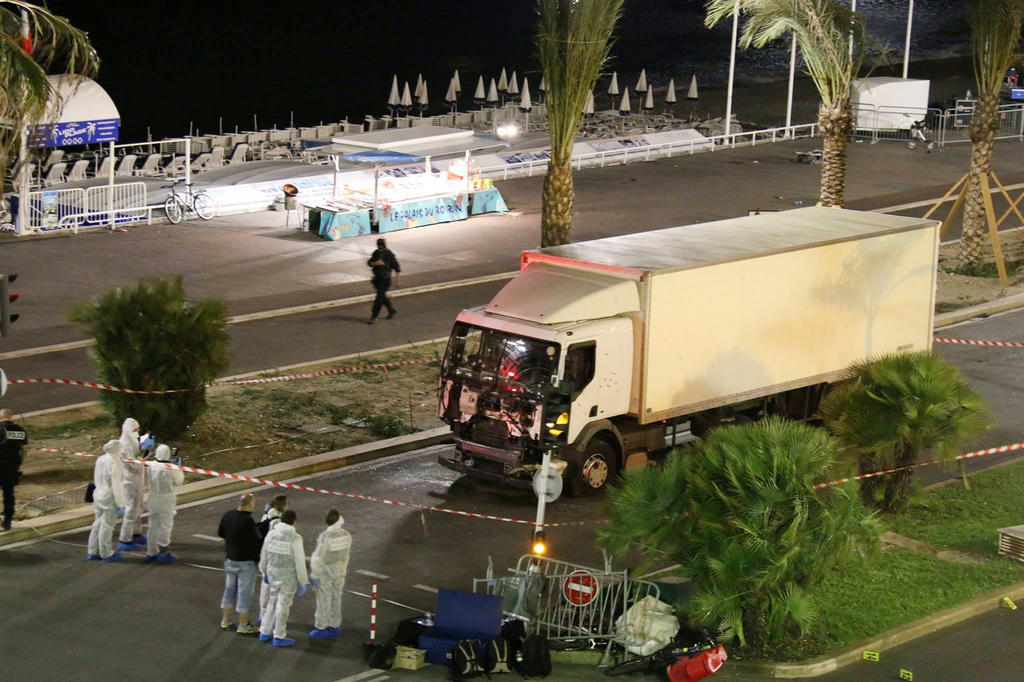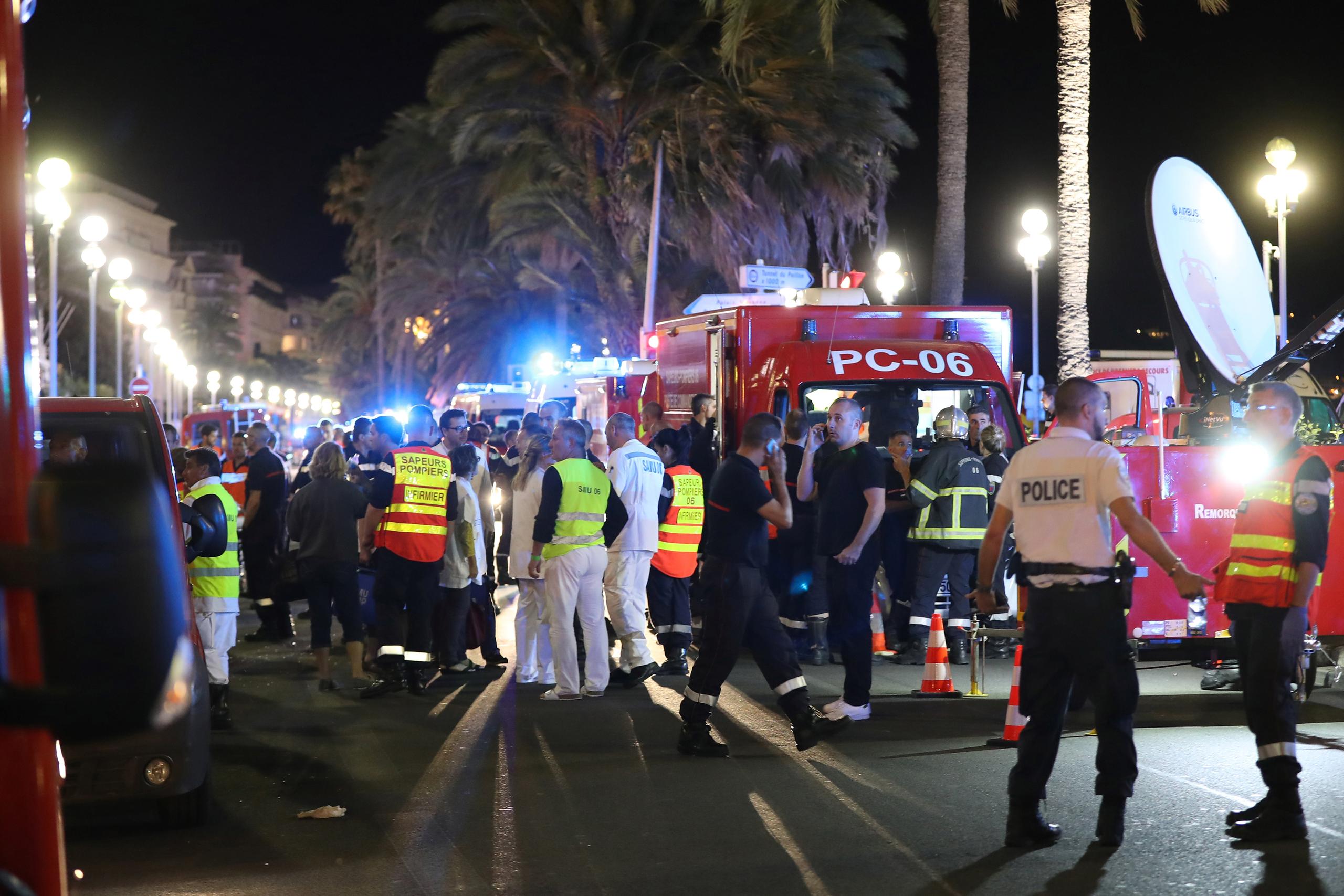
Nice: ‘Ultimately there’s no remedy against this murderous hatred’

The murder of at least 80 people in Nice dominated Swiss newspapers on Saturday, with all front pages featuring photographs of covered corpses. Leader writers struck a depressed and pessimistic tone.
“Mown down in the night” was the headline of Le Temps in Geneva, which devoted its first seven pages to the attack in the south of France late on Thursday.
A man in a lorry zigzagged down a crowded Nice promenade where an estimated 30,000 people had just watched a Bastille Day fireworks show. Witness said he aimed directly for children, for mothers pushing strollers and for families cowering behind plastic benches. At least two Swiss citizens died.
“A new level on the terror scale has been reached with the bloody ride of the kamikaze lorry of Nice,” the paper said in its editorial. “A single man has been able to kill more than 80 people – as, a month ago, a lone gunman fatally shot 49 people in a club in Orlando, Florida.”
The individual attack, it said, had joined mass terrorism. This development painted “a staggering prospect” of an “endless war within our societies waged by fanatics who are embittered and lost to the point of becoming deadly threats”.

More
Switzerland condemns Nice attack
The paper pointed to the situation in Israel, where the thinking is that if the authorities work methodically and for long enough, the well of potential killers will dry up. “But how do you do that when, as in France, the well could contain tens of thousands of individuals with changing profiles: police record or not, French or foreign, north African or not, fathers or broken youths?”
A weakened country
French President François Hollande said the attack was “undeniably terrorist in nature”, but prosecutors said the 31-year-old driver, a Tunisian who lived in Nice, wasn’t known to intelligence services.
“The Côte d’Azur is crying” was the headline in Blick. “What’s going on in France?” the tabloid asked in an editorial.
“Colonial history is leaving its mark on La Grande Nation. The wounds of the Algerian War [1954-1962] never properly healed. Then there was the failed integration of immigrants from the Maghreb [western north Africa]. For years the French acted as though everyone in their country was equal. Problems caused by differences were suppressed,” it noted.
“As the cradle of the Enlightenment, France banished religion from public life – something modern people rightly welcome. Muslims, however, see a headscarf ban for example as a targeted attack on their belief.”
France had been weakened, it concluded. “Not much works really well. In Britain, there’s no way a lorry would have been able to drive down a promenade unopposed on National Day. Strikes paralyse the state as well as the economy and obstruct reforms. Young Muslims in suburbs can’t find work. A few turn to crime, become radicalised in prison and are prepared to die.” The fast solutions? “There aren’t any.”
Illusion
“Let it stop once and for all,” begged a young woman on Twitter after the attack in Nice. But this wish is based on an illusion, wrote the Zurich-based Tages-Anzeiger and Bern’s Der Bund.
“The attacker of Tunisian origin was considered a petty criminal by police but, according to the latest information, he was unknown to intelligence services and was never placed on a watch list for radicalisation. If this is confirmed, the chances of stopping him were next to nothing.”
Ultimately there was no remedy against this murderous hatred against society, it said. “That’s not to say that equipping police and intelligence services, extending states of emergency and allowing security forces to monitor and bug private individuals won’t foil attacks. But such measures can threaten individual values and constitutional principles. And even if nine attempted attacks are thwarted, one successful one will increase collective fear.”
Lack of leaders
The attacks hit French politics at its weakest point, according to the Neue Zürcher Zeitung (NZZ): its lack of leading figures.
“Hollande’s first reaction was extending the state of emergency [that stretched back to the November 13 attacks in Paris that killed 130 people]; a few hours earlier he had said he wouldn’t do this. The measure is helpless and questionable. It’s been in force for more than half a year but was unable to prevent the latest attack. It limits civil liberties and broadens police powers. But it doesn’t, in its own right, increase security. Defending against terrorists – with or without a state of emergency – is a question of police organisation.”
Looking ahead to the French presidential elections in spring, the NZZ predicted that various candidates would outbid each other with proposals and claims on how to eliminate Islamic extremism.
“The competition of aggressive solutions will only strengthen the current malaise running through French society and stoke tensions between various groups in the population. The signs are not of rallying and solidarity, but much more of mutual mistrust and separation.”
What France needed now, the paper concluded, was for political leaders to stand up and take control.
“But it’s doubtful that France currently has men or women of the necessary mettle who can hold together a sceptical nation that has been split apart. Presidential candidates Nicolas Sarkozy and Marine Le Pen are above all stirrers who will foment the hostile atmosphere. Alain Juppé could play a more constructive role, but for the moment, Hollande is still in office. Even though he hasn’t got much hope of another mandate as president, in the coming months it will be above all up to him to deal with the situation.”

In compliance with the JTI standards
More: SWI swissinfo.ch certified by the Journalism Trust Initiative


























You can find an overview of ongoing debates with our journalists here . Please join us!
If you want to start a conversation about a topic raised in this article or want to report factual errors, email us at english@swissinfo.ch.